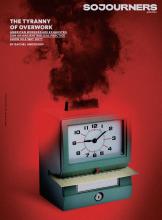I’M NOT SURE where I thought we would be by now, but I didn’t think we’d be here. A global pandemic has ravaged and killed too many of our loved ones to name, though we could have contained it through collective measures. Climate change continues unabated despite decades of warning and appeal, and we may have missed our window to prevent its worst impacts. We’re experiencing perils that are unnecessary and completely caused by our selective will.
Christmastide and the Epiphany season are opportunities for us to recall and perhaps draw hope from the story of God’s inbreaking into a desperate human condition. But we must also remember that, despite God’s extraordinary proximity to humanity in those days, trouble persisted. Jews were still under a repressive occupying power. They were worshipping in a temple built by a leader invested in his own oppression, put in power by their oppressor. Very little seemed to change. If anything, it appeared to get worse.
As with the people in those times, so it is with us today. We who read the text get a peek behind the veil of worldly power to see what God was doing in the shadows. We see what was obscured from those who cried to their Creator or who’d perhaps run out of tears to shed. We see what they could not see at the time. The preacher and teacher will need to pull back anew this curtain for the people—and for self.
Read the Full Article

